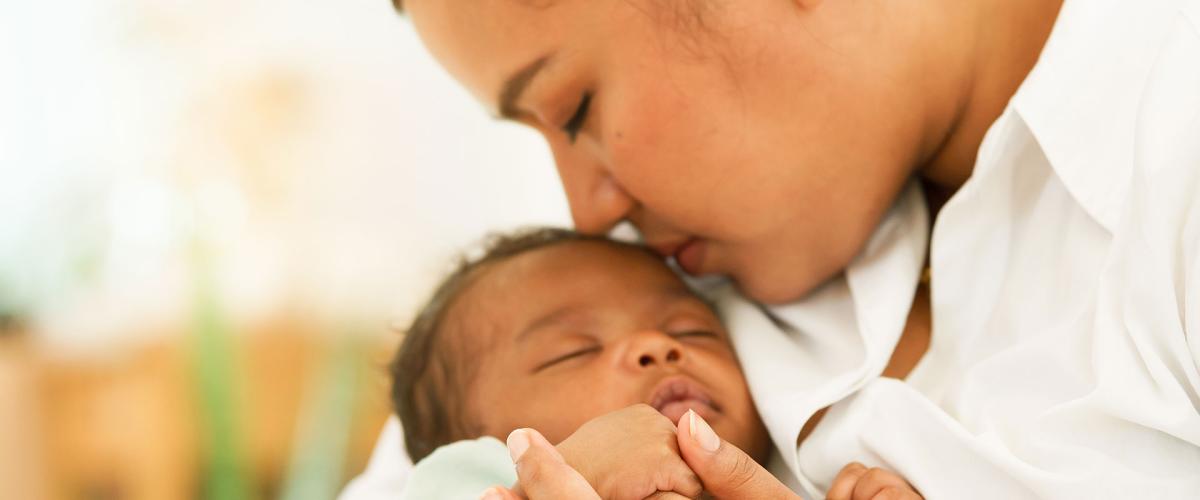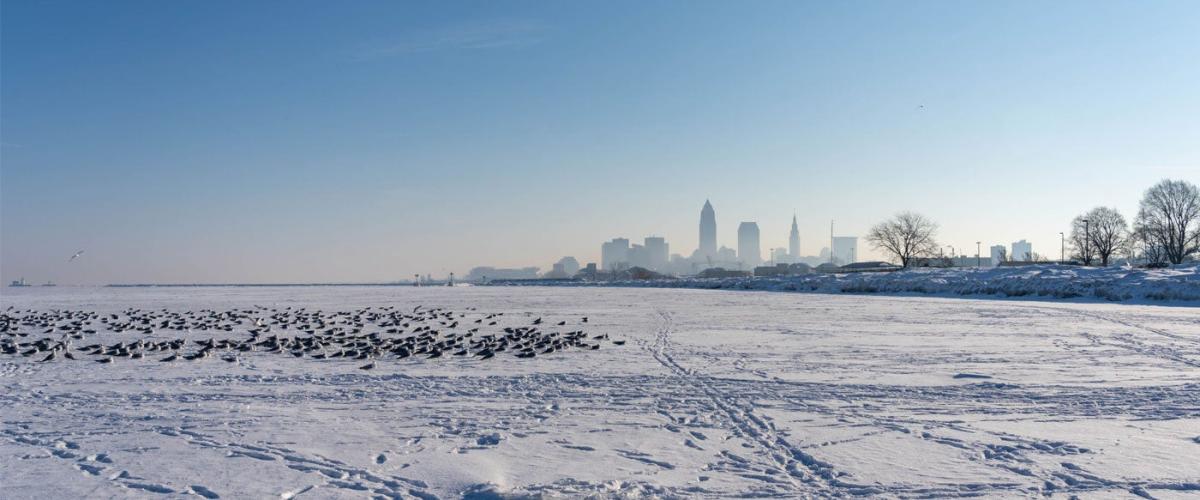Case Western Reserve University students come to campus with impressive résumés. While here, they continue to flourish—and share their knowledge, skills and experiences with our university community, leaving a mark on their peers, instructors and the broader campus and Cleveland communities.
Upon completion of their degree programs, they leave CWRU having achieved remarkable success.
As the Class of 2024 prepares to accept their degrees during commencement ceremonies May 15-19, we’re putting a spotlight on eight outstanding graduates—one from each school—before they move on to the next steps of their professional journeys.
Read more about the Mandel School's featured student below and get to know the other seven graduates.
Emily Saxon
Jack, Joseph and Morton Mandel School of Applied Social Sciences
Class Year: May 2024
Degree Program: MSW On-Campus
Concentration: Community Practice for Social Change
Field Education Organization: Flora Stone Mather Center for Women at CWRU
Hometown: St. Louis, Missouri
If you’ve found yourself on Case Western Reserve’s campus this year, chances are you’ve noticed posters with pie chart graphics in restrooms that read It’s on CWRU to Disrupt the Culture of Violence. It’s thanks to Emily Saxon—who is graduating this week with a Master of Social Work degree—that these posters exist.
As part of her field education experience at the Flora Stone Mather Center for Women, Saxon realized confronting gender equity and sexual violence at Case Western Reserve University required a cultural change.
“These are issues deeply rooted in our societal norms, which means they take a collective cultural shift to truly make change,” she said. “Each and every one of us has a responsibility to help increase gender equity and reduce sexual violence.”
Last summer, she learned small things can have a big impact.
The university had posters about gender-based violence in campus bathrooms but they were several years old and simply stated there were resources available to help students. Saxon redesigned the poster to display a large number of university and community resources so people on campus could easily access the services.
“Creating the design took a lot of time, but overall it was simple,” she said. “I didn’t think much about the possible impact, other than the fact that it would be a source of pride to see my work across the university.”
The design resonated with both campus community members and visitors. Since she hung the posters, Saxon has received many emails and phone calls from people expressing their appreciation or wanting to know how she did it so they could replicate the design for their own work.
“I never expected such success, but I think it’s representative of how you can have a strong impact when you make something comprehensive but clear and accessible,” she said.
Learn more about disrupting a culture of violence by following @itsoncwru on Instagram.
Learn more about Emily Saxon in the below student spotlight.
Give a brief overview of your field education experience(s).
I worked as an education programs assistant at the Mather Center, which is CWRU's gender equity and sexual violence prevention and education center. I had the opportunity to work on a wide array of projects during my two years in the role. My main responsibilities revolved around assisting in the planning and execution of events for awareness months and co-supervising our team of undergraduate peer educators who facilitate workshops and awareness month activities for the campus community. An additional role of mine was to support the Mather Center's violence prevention and response work, through serving on the university's Coordinated Community Response Team (CCRT), which is composed of staff and students from across CWRU who all have a stake in preventing and reducing sexual violence. I also published a monthly newsletter for the CCRT, which provided updates on accomplishments, resources, and upcoming events and trainings.
What are you doing in field that you’re planning to bring with you into your career?
Working in the realm of gender equity and sexual violence prevention and education has taught me much about the need for collaboration. These are issues deeply rooted in our societal norms, which means they take a collective cultural shift in order to truly make change. This means each and every one of us has a responsibility to help increase gender equity and reduce sexual violence, so my job was about equipping others with the tools and knowledge they need to recognize the power they have to do so. I carried this out through all the interactions I had with others, through events and activities, supporting the peer educators in facilitating workshops, serving on the CCRT and partnering with other CWRU offices for programming. Learning the art of relationship building, both big and small, will be essential to the rest of my career as a social worker. The majority of problems facing our society are multi-faceted, which makes teamwork essential; we can learn so much, gain new perspectives, pool resources, diffuse burdens, build power, share wins and accomplish so much more when we work together. It can sometimes be all the more important to invest time in building relationships with individuals or groups who seem unlikely to be supporters, as sometimes the most surprising successes can come from these connections.
What is something you've learned during your practicum that you have found to be the most helpful in your social work journey?
As I mentioned, many of the issues we seek to tackle in social work are wide-reaching and tangled within the structures of our society. This means they are often very complex and slow to change, which can be frustrating when it feels we have adequate resources or approaches to create positive impact. Through my work on gender equity and sexual violence at the Mather Center, I've started the journey of learning how to stay optimistic, how to persevere and how to keep from burning out in the face of challenges or slow downs, all while seeking to implement the center's work. I'm not certain where my career will take me, but I'm confident that understanding how to do so will be relevant to any work environment.
I've also learned that sometimes small things can have a big impact. For example, CWRU had posters about gender-based violence in bathrooms all across campus, but they were several years old and simply stated that there were resources available to help students. Last summer, I redesigned the poster in a way that displayed a large number of university and community resources for gender-based violence so people on campus can easily access these services. Creating the design took a lot of time, but overall it was simple, and I did not think much of the project, other than the fact that it would be a source of pride to see my work across the university. However, the design ended up resonating with both campus community members and visitors—since the posters have been put up, I have received emails and phone calls in the double digits from people expressing appreciation for the posters or wanting to know how I did it so they can replicate the design for their own work. I never expected such success, but I think it is representative of how when you make something comprehensive but clear and accessible, you can have strong impact.
Why did you choose to study social work and/or nonprofit management?
I've always known I wanted to have a career in a helping profession, so when I was younger, I thought I wanted to be a doctor. As I got older and learned more about what it meant to be a physician, I realized it likely wouldn't satisfy me. I learned I wanted to work with whole groups of people, to operate from a more structural and preventative approach, and to tie in more disciplines outside of health. I also knew I had a lot of interests and worried that I might choose a career that would be too narrow. Eventually through meeting people during my undergraduate career, I learned about social work, how broad the field is and how I could pursue upstream and community-level work. This, combined with the social justice lens of the field, made me feel like I had so many options to do the type of work I truly wanted.
Why did you choose CWRU/the Mandel School for your graduate study?
I chose the Mandel School for my master's because of its high ranking in the field of social work and because of the warmth of the admissions staff and the faculty members I got to meet when I toured the school. I was also very involved in research as an undergrad, so I was drawn in by the multiple research institutes housed under the Mandel School. I chose CWRU as a university because of its situation within Cleveland—we are so close to downtown and the city's many diverse neighborhoods. During my time here, I have made a point of getting off-campus, because I felt a personal desire and professional duty to get to know the areas in which I live, work and spend recreational time, as well as the groups of people that exist within them.
What has been your favorite class at the Mandel School so far? Why has it stood out to you?
My favorite class has been Planning and Implementing Social Change. Our professor has really distilled the components of effective organizations and how to create meaningful impact into simple frameworks. This kind of work can feel really abstract, but the course has helped me break it down into comprehensible and specific concepts. It's also helping me to think about my personal positioning within organizations as a young professional and how I can still be an asset while having more limited experience.
Describe any job, internship, volunteer, research or study abroad experiences you've had during your time at CWRU.
Last summer, I had an internship in the city of Shaker Heights' planning and development department. I just wanted to try something that was new but still related to social work, and it was great because I got the chance to explore community engagement from the perspective of planning for a city's future and enhancing its existing assets. I learned about projects happening in Shaker Heights from new bikeways, to public art, to the process of applying for grants to improve local parks.
Describe any extracurricular activities you're involved with on- or off-campus, or any interests, activities or passions.
One of the most impactful experiences during my degree has been the unique environment in which I live. I am a resident of a cooperative home for graduate students called Steiner House. There, I have sixteen fellow housemates all pursuing various graduate degrees at CWRU, most of whom are international students. We are a very multicultural household, and my fellow residents have a diverse range of ages, nationalities, religions, languages and walks of life. We are completely self-run and democratically governed, so we each take turns cooking, doing chores, having leadership positions, and we constantly have to work together to decide how to spend our money and make decisions about operating procedures. The house has taught me so much about how to see from other's perspectives, even when they are very different from your own, and about how to engage in uncomfortable conversations that are deeply connected to culture and world views while maintaining respect and working to find understanding. It's also just a lot of fun! I am not a native of Cleveland, let alone Ohio, so when I moved here for school, it was very important to me to build a strong social network. Steiner House has given me just that—it is my family away from home and has been a source of support during hard times. My housemates and I are friends, and we spend a lot of time hanging out, either at home or going to events around town. We often have celebrations for various holidays—with plenty of food—and we celebrate each other's accomplishments, birthdays and more!
What is your favorite thing about Cleveland/University Circle?
I think Cleveland is such an amazing and underrated city. It was a major reason why I chose to come to CWRU, and I am really excited by all the growth and revitalization Cleveland is undergoing. It's a big enough city that there is always something to do, but it's also small enough to feel like you can get to know it very well. My friends and I love trying new bars, restaurants and coffee shops; walking in the Metroparks; and going to concerts, sporting events and cultural activities. I also appreciate how many opportunities there are to learn and get involved with the community, from the museums, to the international neighborhoods that call Cleveland home, to volunteering organizations.
What do you hope to do with your degree?
I think my career will take me in a lot of different directions, which is great because I have so many interests and like to have new experiences. Currently, though, I am interested in starting my professional journey in community engagement work, ideally at a community development corporation. This might look like using various events, programs and activities to interact with residents, business owners, city and county government officials, and other stakeholders to stimulate social and economic development within and across Cleveland neighborhoods. The goal is to empower residents to become involved with initiatives so that changes are not only informed by resident voices but co-created with them.
Do you have any plans for after graduation yet?
I was selected for the Cleveland Foundation's Public Service Fellowship and will be working at Old Brooklyn Community Development Corporation (CDC), starting in August. I'll be in a cohort of fellows from across the country who are also recent graduates and interested in careers in the nonprofit arena. It's a one-year position where each fellow is placed at a host site in the city, while also regularly coming together with the rest of the cohort for professional development experiences through the Cleveland Foundation. I'll be working to help the CDC create metrics to track and communicate the impact of all their programs and initiatives. I'm really excited to start my career in this type of environment and to make friends with the others in my cohort.
What are you most looking forward to post-graduation?
I'm looking forward to staying in Cleveland and getting to know the city that much better! I'm also excited for some much needed relaxation before starting full time work. We so often overlook the importance of rest. This summer, I'm planning to cook, garden and picnic; to attend plenty of Wade Oval Wednesdays and Metroparks concerts; to get outside as much as possible; to swim in the lake; to spend time with my friends; to check some Cleveland retail, food and bar spots off my bucket list; and to catch up on some reading.
What's something you'd share with an incoming student who is starting a graduate or professional program at CWRU?
I would encourage new graduate and professional students to know their limits about how much work they can take on and to set boundaries when needed, but to also say yes to experiential or extracurricular opportunities that interest them. Schoolwork is certainly important, but sometimes taking time away from that to invest in building relationships, to try new things or to feed the soul are even more valuable. You never know what those kind of experiences can lead to, either personally or professionally. Studying can teach you a lot, but there is also so much to learn from other people, and with all the challenges of graduate school and young adulthood, it's vital to have others to lean on in hard times. Trying new activities or projects in the context of socializing or part-time work can also provide insight into other professions, expand your worldviews, and introduce you to things that help shape the rest of your academic or career journey.




